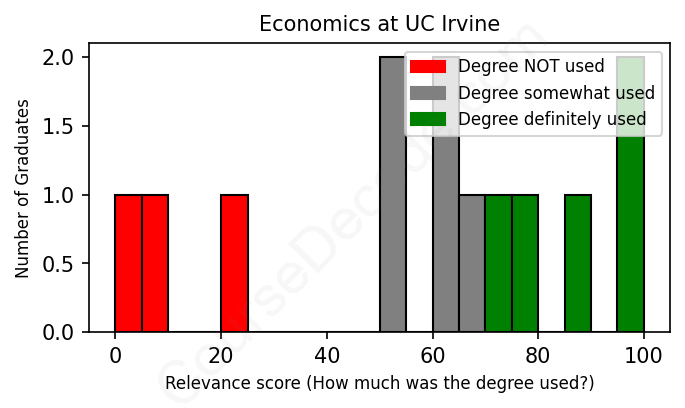
First, some facts. Of the Economics graduates from UC Irvine we've analyzed , here's how many have used (or NOT used) their degree in their career:

These are estimates based on AI analysis of 13 LinkedIn profiles (see below).
The verdict? Below average. Overall, with an average relevance score of 58%, Economics graduates from UC Irvine have a lower likelihood (-9%) of finding work in this field compared to the average graduate across all fields:
And for comparison, here's the chart for all profiles we've looked at across all degrees.
Also, after graduating, only 15% of these graduates have pursued further education other than another Bachelor's degree (such as a Masters degree or other), compared to the average across all profiles of 35%. This suggests a Bachelors degree is enough for most Economics graduates, and it's normal to look for work straight after graduation.
See the details:
|
Relevance score: 100% We think this person has gone into a career highly relevant to their degree. We think this person has gone into a career highly relevant to their degree.
DEGREE INFOGraduated in 2019 from UC Irvine with a Bachelor of Arts - BA in Economics. No other secondary education since. JOB HISTORY SINCE GRADUATIONJunior Private Equity Associate Haitong Securities Jan 2020 - Present ABOUTNo information provided. |
The top 10 most common jobs done by the graduates we've analyzed (ranked most common to least) are:
So, when we look at the jobs held by UC Irvine Economics grads, it's a mixed bag. A lot of them leap into roles like financial analysts, accountants, or loan surveillance analysts, which are super relevant to Economics since these positions deal with financial analysis, decision-making, and the application of economic principles. On the other hand, there are quite a few who end up in roles that aren't really tied to their degree, like software engineers, sales managers, and design consultants. These positions often prioritize skills unrelated to economics, focusing more on operational tasks, customer service, or creative tasks.
Overall, while some graduates have found careers where they can flex their economics muscles and apply what they learned in school, many others have strayed into fields that barely scratch the surface of economic theory. This indicates that, while an Economics degree can certainly open doors, graduates often find themselves in jobs that require a broader set of skills or different expertise altogether. So, if you're considering majoring in Economics, it’s worth thinking about what kind of job you actually want to do afterward and how closely that aligns with your studies!
Here is a visual representation of the most common words in job titles for Economics graduates (this is across all Economics graduates we've analyzed, not just those who went to UC Irvine):

When you look at the career trajectories of UC Irvine Economics graduates, it's pretty clear that a lot of them end up in roles that are either directly related to finance, analytics, or operations in their early careers. For instance, many graduates score their first jobs in consulting, analysis, or sales, which makes sense given their training in critical thinking and data analysis. As they gain experience—say, five years down the line—they often move into mid-level roles that require more responsibility, like financial analyst positions or management roles in operations. You can see this pattern pretty clearly; many graduates who start in entry-level roles end up climbing the ladder in finance, consulting, or tech-related jobs by their fifth year or so.
However, it’s worth noting that not every graduate sticks strictly to economics-related careers. Some venture into diverse fields such as interior design or software engineering, suggesting that the versatile skill set they acquire during their studies can lend itself to various industries. By the ten-year mark, many alumni gain significant experience, often holding managerial or higher-ranked positions, particularly in finance or tech. Overall, while some grads may meander a bit off the economics path, most seem to find solid ground in careers that utilize their degree effectively, leading to promising outcomes over time.
Getting a Bachelor’s degree in Economics at UC Irvine is definitely a solid challenge, but it's not the hardest thing out there. The coursework can get pretty intense, especially with the math and analytical aspects, but if you have a decent grasp of algebra and enjoy problem-solving, you should be able to keep up. It’s a step up from high school, so you'll need to stay organized and manage your time well, but most students find that with some effort, they can handle the material. Overall, it’s about average difficulty—definitely requires commitment, but it's doable!
Most commonly, in the LinkedIn profiles we've looked at, it takes people 4 years to finish a Bachelor degree in Economics.
Looking at these UC Irvine grads’ career paths, it seems like most of them are doing pretty well, especially the ones who got into finance or tech. Graduates from 2010 through 2018 have landed roles in banking, financial analysis, and software engineering, fields that generally pay decent salaries, particularly as they gain experience and move up the ladder. For example, those in finance like the AVP Analyst seem to be advancing into higher-paying positions pretty quickly. On the other hand, some grads in areas like design and sales may have more variable incomes depending on the job and company. Overall, while not every job screams big bucks, many of these people appear to be on a solid financial path straight out of college!
Here is a visual representation of the most common words seen in the "about" section of LinkedIn profiles who have a Bachelor degree in Economics (this is across all Economics graduates we've analyzed, not just those who went to UC Irvine). This may or may not be useful:

Here are all colleges offering a Bachelor degree in Economics (ordered by the average relevance score of their Economics graduates, best to worst) where we have analyzed at least 10 of their graduates: